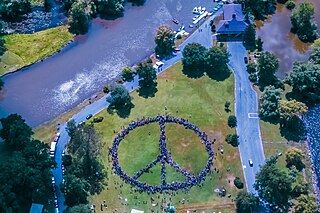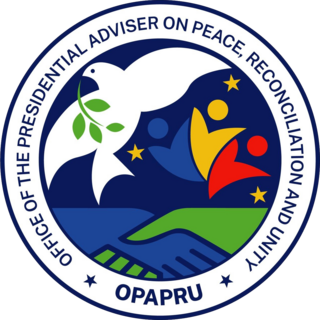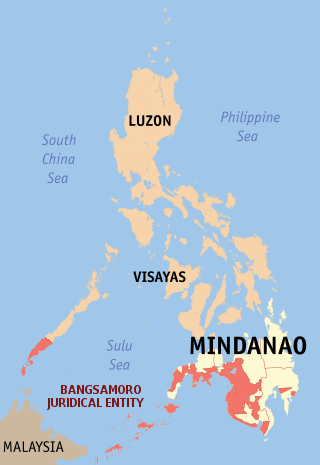
The Moro Islamic Liberation Front is a group based in Mindanao seeking an autonomous region of the Moro people from the central government. The group has a presence in the Bangsamoro region of Mindanao, the Sulu Archipelago, Palawan, Basilan, and other neighbouring islands. The armed wing of the group was the Bangsamoro Islamic Armed Forces (BIAF), although the name of its parent organization, the MILF, was often used to refer to the BIAF. In July, 2018, the Philippine government passed the Bangsamoro Organic Law, giving more autonomy to Muslims. In return, MILF announced that it would disarm its 30,000 fighters.
Kumar Rupesinghe was a Sri Lankan academic and activist involved in social issues, particularly human rights, development issues, processes of globalisation, conflict prevention/resolution, and conflict transformation in the light of peacekeeping and peacebuilding for a harmonious coexistence among all peoples in the world.

The Centre for Humanitarian Dialogue (HD), otherwise known as the Henry Dunant Centre for Humanitarian Dialogue, works to prevent and resolve armed conflicts around the world through mediation and discreet diplomacy.

Peacebuilding is an activity that aims to resolve injustice in nonviolent ways and to transform the cultural and structural conditions that generate deadly or destructive conflict. It revolves around developing constructive personal, group, and political relationships across ethnic, religious, class, national, and racial boundaries. The process includes violence prevention; conflict management, resolution, or transformation; and post-conflict reconciliation or trauma healing before, during, and after any given case of violence.
Consortium of Bangsamoro Civil Society, abbreviated as CBCS, is the largest umbrella civil society organization (CSO) composed of 168 Moro non-governmental organizations (NGOs) and peoples organizations (POs) in Mindanao, Philippines.
Maradeka, is an emerging pro-democracy Muslim political organization espousing non-violent political action in the Philippines amidst the backdrop of over four decades of armed Muslim insurgency mounted by Moro National Liberation Front (MNLF) and Moro Islamic Liberation Front (MILF) in their Moro Quest for self-rule after people dissenting Philippine government treatment of Muslim minority as second class citizens and suffering years of social, economic, and political inequities called Mindanao problem
The Mindanao Peoples Caucus (MPC) is a grassroots network of Indigenous Peoples, Bangsamoro and Christian communities and leaders who have common vision for peace in Mindanao. MPC is known to have stood up for the struggle to finally resolve the age-old armed conflict in Mindanao through a negotiated political settlement that contains the essentials acceptable to both negotiating parties and that addresses the historical oppression and forced marginalization of the native inhabitants and indigenous peoples of this island.
International Contact Groups are "informal, non-permanent international bodies that are created ad hoc, with the purpose of coordinating international actors in their aim of managing a peace and security crisis in a specific state or region (single-issue). They are founded and formed out of by states and/or International Organizations/Regional Organizations. They do not have own administrative structures, but are official announced and meet periodically." Since 1977, at least 27 ICGs have been formed.
Center for Justice and Peacebuilding (CJP) is an accredited graduate-level program founded in 1994. It also offers non-credit training. The program specializes in conflict transformation, restorative justice, trauma healing, equitable development, and addressing organizational conflict. CJP is housed at Eastern Mennonite University (EMU) in Harrisonburg, Virginia, which describes itself as "a leader among faith-based universities" in emphasizing "peacebuilding, creation care, experiential learning, and cross-cultural engagement." One of the three 2011 Nobel Peace Laureates, Leymah Gbowee of Liberia, earned a master's degree in conflict transformation from CJP in 2007.
In the late 1960s, an independence movement was founded in Mindanao, the Philippines to separate the Muslim majority-Moro areas from the rest of the Philippines.

The Framework Agreement on the Bangsamoro is a preliminary peace agreement signed in the Malacañan Palace in Manila, Philippines on October 15, 2012. The agreement calls for the creation of an autonomous political entity named Bangsamoro, replacing the Autonomous Region in Muslim Mindanao (ARMM) which was described by Former President Benigno Aquino III as "a failed experiment".

The Comprehensive Agreement on Bangsamoro (CAB) is a final peace agreement signed between the Government of the Philippines and the Moro Islamic Liberation Front on March 27, 2014 at the Malacañang Palace in Manila. Under the agreement, the Islamic separatists would turn over their firearms to a third party, which would be selected by the rebels and the Philippine government. The MILF agreed to decommission its armed wing, the Bangsamoro Islamic Armed Forces (BIAF). In return, the government would establish an autonomous Bangsamoro. Power sharing was a central point to the autonomy redesign.

The 1976 Tripoli Agreement was signed on December 23, 1976 in Tripoli, Libya by Carmelo Z. Barbero, representing the Government of the Philippines and Nur Misuari of the Moro National Liberation Front. The agreement defined autonomous administrative divisions for Muslims in the southern Philippines, the establishment of an autonomous government, judicial system for Sharia law and special security forces, and the observance of a ceasefire. The autonomous region was to have its own economic system, including an Islamic bank.

The Jeddah Accord was signed on January 3–4, 1987 in Jeddah, Saudi Arabia by Aquilino Pimentel Jr., representing the Government of the Philippines and Nur Misuari of the Moro National Liberation Front. The two panels agreed upon the continued discussion of the proposal of the grant of full autonomy to Mindanao, Basilan, Sulu, Tawi-Tawi and Palawan subject to democratic processes.
The 1996 Final Peace Agreement, also called the Jakarta Accord was signed on September 2, 1996 in Manila, Philippines by Manuel Yan, representing the Government of the Philippines and Nur Misuari of the Moro National Liberation Front. The culmination of four years of peace talks, the agreement established mechanisms designed to bring about the full implementation of the 1976 Tripoli Agreement.

Thania Paffenholz, born on 2 February 1965 in Cologne, Germany, is an academic and policy advisor working on peace processes. She is currently Director of Inclusive Peace. Thania Paffenholz has led comparative research of peace processes for over two decades and has been an advisor in peace processes in Mozambique, Angola, Somalia, Kenya, Uganda, South Sudan, Mali, Afghanistan, Nepal, Sri Lanka, Myanmar, Yemen, Egypt, El Salvador, Syria and Colombia. She received the Wihuri International Prize in 2015 for her work as a peace researcher.
The Guatemalan Peace Process lasted from 1994 to 1996 and resulted in the Guatemalan Peace Accords.

The Office of the Presidential Adviser on Peace, Reconciliation and Unity (OPAPRU), formerly Office of the Presidential Adviser on the Peace Process is a government agency which handles peace talks and negotiations related to internal conflict and rebellion in the Philippines most notably the CPP-NPA-NDF and Moro conflicts.
The Maputo Accord, officially the Maputo Accord for Peace and National Reconciliation, is a peace agreement between the Government of Mozambique and Renamo, signed on 6 August 2019, with the aim of bringing definitive peace to Mozambique. The agreement was signed by the President of the Republic of Mozambique, Filipe Nyusi, and the leader of Renamo, Ossufo Momade, in Maputo, and was the result of years of negotiations. It was preceded by the signing of the Agreement on the Definitive Cessation of Military Hostilities, on 1 August 2019, in Gorongosa.

The Bangsamoro Juridical Entity (BJE) was a proposed subdivision in the Philippines spanning portions of Mindanao and Palawan. Conceptualized during the peace talks between the government of the Philippines during the administration of President Gloria Macapagal Arroyo and the Moro Islamic Liberation Front (MILF), the BJE was the proposed expanded successor to the Autonomous Region in Muslim Mindanao (ARMM).









